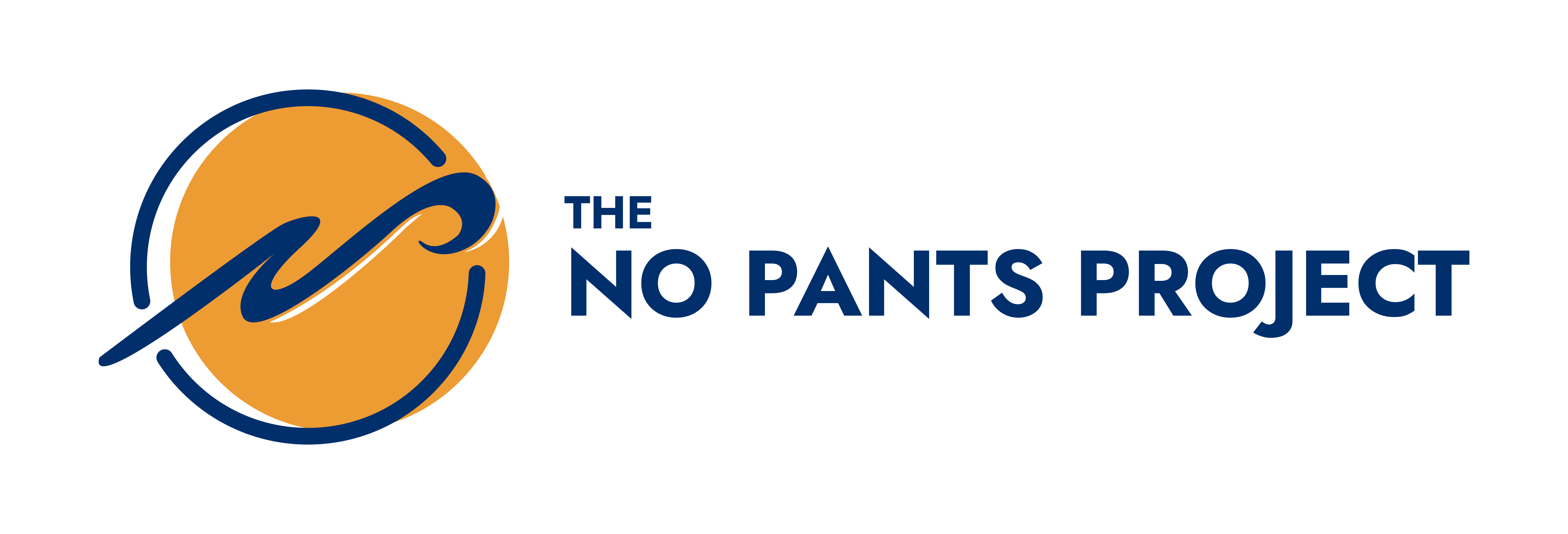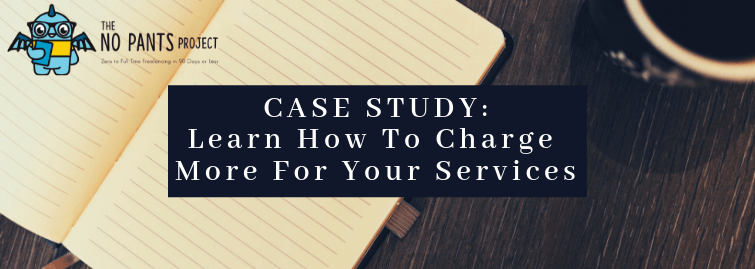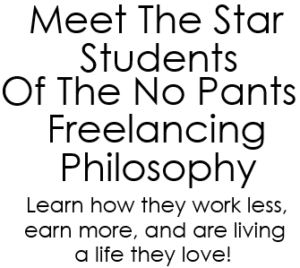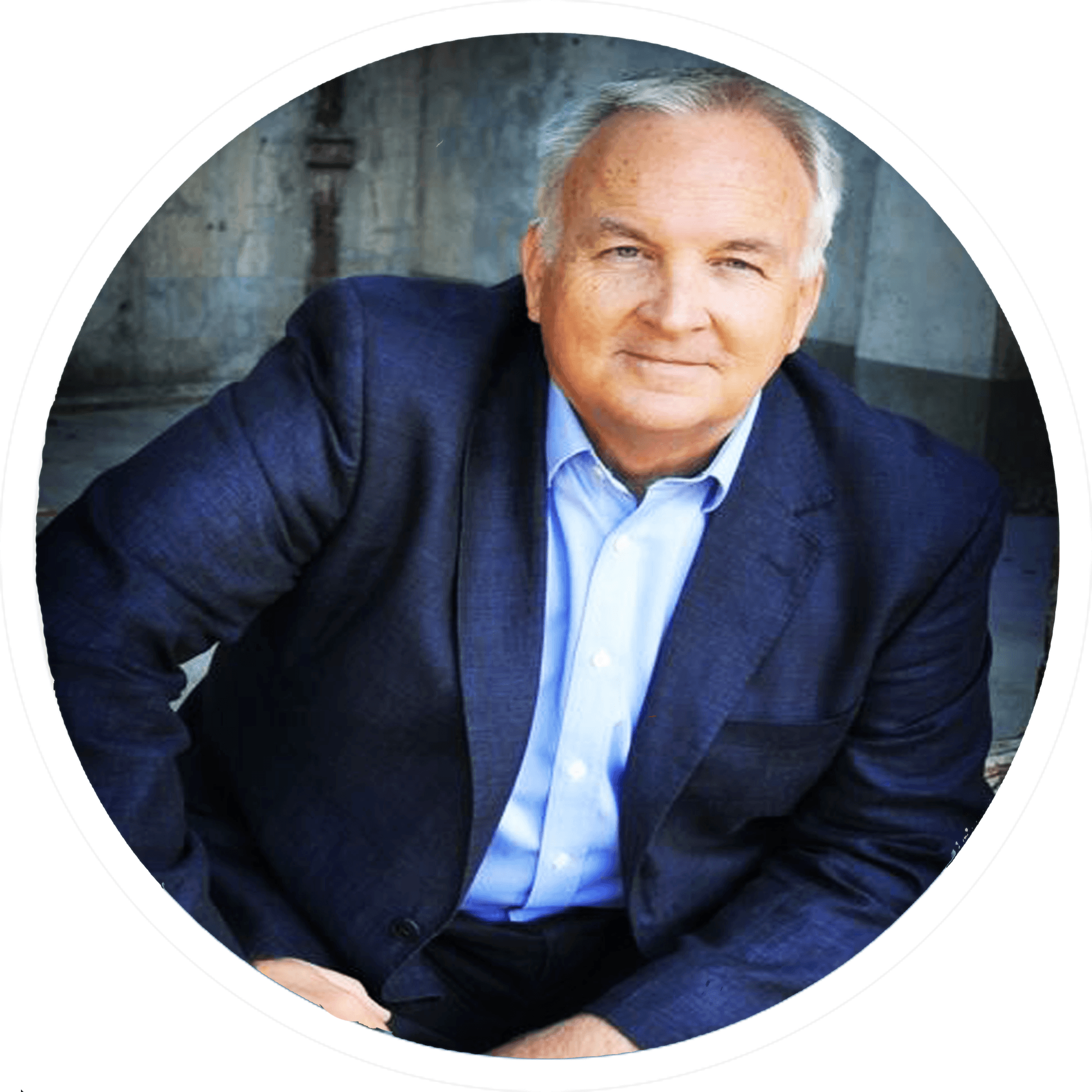If you type “world’s greatest copywriting coach” into Google, do you know whose name comes up immediately?
David Garfinkel.
He is known as the the world’s greatest copywriting coach.
He is also the copywriting mentor of Mike Shreeve, creator of The No Pants Project.
And, he was the second guest of The No Pants Show, hosted by Susan Rook D’Ettore.
David Garfinkel has been a professional copywriter since 1993, but now his main work is in coaching and critiquing other copywriters.
He also hosts the Copywriter’s Podcast, which has over 70 episodes of valuable content for anyone who is thinking about becoming a copywriter, or wants to improve their copywriting skills.
A sales copywriter is one of the 20 most marketable freelancer positions, so if this is the path you’re thinking about taking with your freelancing career, you’ll want to hear what David says are the three things you need if you want to be a successful copywriter:
#1: You Need To Know How To Write
“You need to be able to explain things in short, simple sentences, that gets people’s attention,” David said.
Copywriting is different than the kind of writing you probably learned in school.
David explained: “Copy is a persuasive, spoken conversation in written form.”
When you’re writing copy, unlike when you’re writing for school, you can end a sentence with a preposition.
“When people talk, they end sentences with a preposition all the time. Know what I’m talking about?” David explained, ending his sentence intentionally with a preposition.
So, you may have to unlearn many of the things you learned about writing in school, if you want to be a copywriter.
In school, you learned to write about a topic with a main idea, supporting sentences in a paragraph, and a conclusion.
All your sentences follow all the grammatical rules.
You had to follow a prescribed guide to writing.
Copywriting is completely different, and you may need to learn how to do it all over again if you want to be a copywriter that gets paid for your writing.
Short, simple sentences.
Get people’s attention.
Most likely, no paragraphs of text.
And, David also emphasized that copy should be written like a spoken conversation.
When you read it, it should sound like someone is speaking, rather than writing a research paper.
One place you can start if you’d like to learn to write this way is from copywriting legend Gary Halbert and The Gary Halbert Letter.
#2: You Need To Know How To Sell
“Writing is important, but being able to sell is twice as important when you’re writing copy,” said David.
This is one of the main differences between copywriting and other kinds of writing.
Copywriting is selling something. 
Even content writing (like for a blog post or a website) is different than copywriting in this way.
Other forms of writing are informative, and not necessarily trying to sell something.
But, copywriting is selling.
“You have to be comfortable taking a position, suggesting an idea, and asking people for money,” explained David in the interview.
Not everyone may be comfortable selling something with their writing, so you have to know that you want to do this, and that can do this before you decide you want to be a copywriter.
Susan, host of The No Pants Show, asked David to talk more about selling.
She asked him, what if you don’t want to be a copywriter because you don’t want to be like that annoying car salesman?
What if you hate selling?
“The reality is, if you’ve ever bought something and another person was involved, selling occurred,” responded David.
“The best sales people don’t look like they’re selling. They look like they’re trying to help you. They’re listening. They’re making suggestions. And they’re framing things in a way that it makes so much sense to buy what they’re suggesting,” David explained.
“That doesn’t seem like selling, right?”
“THAT’S SELLING!!”
The salespeople that you might think of, like those used car salesmen, are really just bad salespeople.
That’s not the whole world of selling, just a small part of it that shows you how bad selling can be.
And, you don’t have to do that to be a copywriter.
David continued, “The best salespeople make you feel so relaxed, so comfortable … they put together a sales argument or narrative, so that the person who buys really thinks it was their idea.”
“That’s really what copywriting is.”
There is copywriting that is screaming and selling in your face, but it doesn’t have to be that way.
David talked about the sales letter he wrote that made the most money for a client
This sales letter made his client $40 million!
He said that letter “didn’t seem like sales at all.”
“It was a low-key, empathetic offer.”
The sales letter touched on a pain of its customers and clearly told them how the company would help them solve that pain.
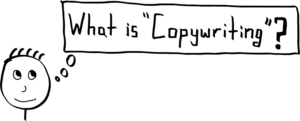
Selling doesn’t need to be seen as a bad thing. We all do it.
When a baby cries because it wants milk, he’s selling.
When you’re trying to get your spouse to do the dishes, you’re selling.
When you’re trying to get time off from your boss, you’re selling.
When you’re trying to get your kid to eat their vegetables, you’re selling.
It happens all the time, even without you knowing it.
“The more sophisticated the salesperson is, the less likely they’ll tell you that they’re a salesperson and the less likely you are to realize it,” David said.
David gave the example of Amazon.com.
“Have you ever shopped on Amazon?” he asked Susan.
“All the time!”
“Do you think they sold it to you?”
“… um …”
“You’re not sure, are you!” David pointed out.
But then, he went on to say, “If we looked at an Amazon page, I could show you all of the subtle selling that they’re doing.”
“It’s not covert. It’s not sneaky.”
“It’s just not noisy and brassy and obnoxious and pushy.”
“But, they’re selling.”
“They even let their customers sell for them — with reviews,” David explained.
You’re being sold to all the time and you don’t even realize it.
Not all selling is like the used car salesman.
That’s just the bad example of selling. And that’s not really what being a copywriter is about.
“Selling isn’t bad,” David said.
“Bad selling is bad. Good selling is good.”
“People need information. They need direction. They need persuasion. They need to know what their options are, and if you can frame it in a way that’s better than anyone else, they’ll buy from you.”
Susan asked David a follow-up question from a member of the No Pants Project Open Community audience:
“How do you, as a copywriter, figure out whether or not the company can back up the claims that you make in the copy? Or do you even worry about that?”
“Yes, I do worry about that,” David said.
And then, he quoted legendary copywriter Gary Bencivenga, who said:
“A gifted product is more important that a gifted pen.”
David said that to find out if the company is offering a legitimate product and can back up their claims, he does what any consumer might do.
He goes online and looks at their website. He talks to them. He does due diligence and research.
He also might ask for a sample of the product.
He looks for experience, like a press release for his coffee maker that says the engineers made over 1,000 prototypes before they finalized it.
When you see information like that, you know that a company has put the work in and is selling a good product.
Bonus Reading: How To Sell Without Selling (In 2 Parts)
#3: You Need Curiosity
 Finally, David said to a be a good copywriter, you need to be curious.
Finally, David said to a be a good copywriter, you need to be curious.
One of the latest episodes of David’s Copywriters Podcast is called Insatiable Curiosity.
From the podcast show notes, David says, “Curiosity is how you get motivated to find the interesting tidbits that make your copy shine, and keeps your readers reading.”
If you want to be a good copywriter, you need to curious about how things work.
You need to find the interesting information to include in your copy.
You need to want to dig deep into a topic and figure out what a reader would find most interesting about the product.
What’s the story behind the product? What’s the story behind the person who made it?
Did the engineers really make 1,000 prototypes of that coffee maker before they finalized it?
What was it like when they first started?
What were the changes they made along the way that a potential buyer of that product might be interested to know about?
That’s the information that will keep people reading your copy and will feed their curiosity for what you’re selling them.
I was curious to know more about what David thought about a copywriter’s need for curiosity, because Susan and David didn’t get into this point too deeply in The No Pants Show interview.
In the podcast, David says that insatiable curiosity is “being interested in everything.”
He continues:
“For copywriters, if your copy is only about features and benefits, okay, it’ll work, but it becomes pretty boring, pretty routine.”
“Unless someone has an urgent need for your product (usually not the case), no one’s going to buy from really mechanical, routine copy.”
“How do you get the other stuff besides the mechanical, routine features and benefits?”
“You need to be curious.”
“Curiosity, especially insatiable curiosity, provides you with the fuel you need to fill your copy with the energy that makes it really interesting.”
I Love Writing. How Do I Get Paid For It?
In The No Pants Show interview, Susan asked David the question that many members of the No Pants Project Open Community have when they start thinking about being a freelancer:
I love to write. But, how do I get paid to write?
- David offered some suggestions on how to get started as a new freelance copywriter:
- Write for free at first, or at below market rates. Although you may not want to do this, you may need to until you get the experience you need to show you can do what you say you can do for a potential client.
- Create samples that look like the kind of copywriting you’d do for a company that you’d want to work with.
- Write on “spec” — a company gives you an assignment, you write it, and then they choose whether or not to pay you for it.
- Get training, from The No Pants Project, or by listening to the Copywriter’s Podcast.
- Read books, like David’s newest book, “Breakthrough Copywriting”.
- David also recommended reading two books by Napoleon Hill: “Think and Grow Rich” and “Outwitting the Devil”.
- And then, of course, as the “world’s greatest copywriting coach,” David provides personal copywriting coaching services through Garfinkel Coaching.
But, ultimately, David recommends that you do the work to get the experience you need.
You have to “pay your dues, get your street cred,” David said.
You’re not going to be paid $50,000, plus royalties, for a writing assignment immediately.
(Although that kind of payment is possible — David has gotten that in the past.)
More likely, to start, you’ll get paid $300 for a sales letter, which is what David was paid for that sales letter that made his client $40 million!
You’ll start small, you’ll get the experience you need, and you’ll build up.
Just make sure you have these three things that David Garfinkel, the world’s greatest copywriting coach, says you need if you want to be a copywriter:
- Know How To Write: Short, simple sentences that get people’s attention. Unlearn what you learned in school about writing.
- Know How To Sell: The best salespeople don’t look like they’re selling. They make you think it was your idea all along to buy that product.
- Curiosity: Insatiable curiosity — you have to know everything about a topic. How it works, take it apart and put it back together until you know everything about it. That’s what makes your copy really shine.
Watch the Full Video
Watch the full No Pants Show interview with David Garfinkel here:
If you’d like help building your freelance writing business, you can also join The No Pants Project.
